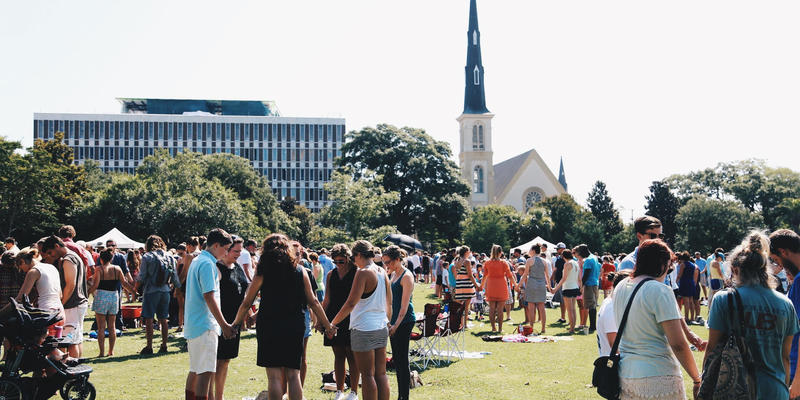
I have really found myself at a loss for words as to the recent tragic shooting in Charleston, South Carolina, on Wednesday, June 17, 2015. My heart goes out to the victims and the families who lost loved ones in what was nothing less than a terrorist attack and most certainly a hate crime.
When the shooter, Dylann Roof, walked in Emmanuel AME during bible study and prayed alongside the 13 people in attendance before opening fire and killing nine, he was sending a clear message—black lives don't matter. People keep asking me how I feel about this, and the fact of the matter is, I’m not surprised in the least bit.
I’ve been actively studying African American history for the past 12 years, so I’m well aware of the ways in which racism, white supremacy, and hate manifest themselves in our society. To me, this was just one of many recent, overt examples of what happens when white supremacists go unchecked. On the other hand, perhaps one of the most important conversations to come out of the Charleston Church Shooting is the impact racism and white supremacy has had on white Americans and, more importantly, what white people can do to heal their communities from within.
Author and white South Carolina native Baynard Woods wrote that it’s the responsibility of the white community to “save themselves from racism and white supremacy." He went on to add that white people must stop consenting to racism with their silence. Stop letting “racist jokes go unchecked,” he said. Stop looking the other way at the various forms of “sanctioned acts of bigotry.” The tragedy that took place last Wednesday may have been avoided had someone in Roof’s life stepped up in some way. According to his roommate, not only did Roof kill nine African Americans, but he planned and talked about it for months. Yet, (white) people in his life who knew about his racist ideologies and intentions to incite a so-called race war did nothing to stop him.
In the days since the shooting, I’ve received numerous awkward, albeit well-meaning, messages from white associates expressing anywhere from misplaced guilt, to embarrassment about being grouped in the white category alongside individuals like Roof, to frustration about not being able to do more to change the attitudes of their white peers who may think like or sympathize with Roof. For me, the latter is what matters most—whether or not they will stand up to the blatant prejudice and racism of their white peers.
Challenging someone’s reality is not an easy task. During my freshman year in college, I had a great professor who changed my life. She helped me to discover and accept my African heritage and develop an awareness of what it means to live in a society founded on white supremacy and racism. I was so surprised when other black people I spoke with (friends, family, colleagues, perfect strangers, etc.) didn’t jump on board with me when I began growing out my natural hair, wearing African-styled head wraps, and got a tattoo of Africa. As I delved deeper in black studies, I began to realize the many ways in which white supremacy impacted African American identity. I realized that a lot of the people around me had accepted the idea of black inferiority/white superiority, and whatever stereotypes that came with this, as fact. Eventually, I concluded some people are open to changing the way they view the world and others are comfortable in their ignorance. I prefer to use my energy on the former, i.e., people who are willing to learn new things, challenge their previously held beliefs, and think critically about the world around them.
As a black history major and former historical interpreter, I receive a lot of joy and fulfillment from helping people, particularly black people, understand how and why it’s important to embrace their identity without the stigma of white supremacy. Last Friday, for example, I facilitated a Liberation School session sponsored by Black Lives Matter Charleston. It was attended by a diverse group of about 20 or so individuals from all over the US. We met at the Avery Research Center for African American history and culture and discussed a variety of themes on the black experience, from how the history of African Americans begins in Africa, to the impact white supremacy and racism has had on blacks as well as whites in the US. We connected the various topics with current events like the Charleston Church Shooting to the controversy surrounding former NAACP President Rachel Dolezal, who was born white but has been passing as black. Many of the attendees—both black and white, male and female—expressed how much they took from the session and the importance of creating such spaces for people to feel comfortable speaking candidly about race relations and how they impact our day-to-day lives. Though the session was mostly attended by African Americans, there were some white people in attendance, and I was able to speak with some individually about how they can take the information they gained back to all-white circles in order to spread awareness and combat racism. That is exactly what we need our white allies to do. That is their most important task because white people who have internalized white supremacy and racism are a lot less likely to listen to and take black people seriously as we talk about our experiences.